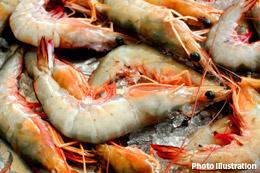Be wary of Asian shrimp containing antibiotic-resistant bacteria

A CBC Marketplace investigation has found worrying levels of antibiotic-resistant bacteria on imported shrimp bought at major grocery stores across Canada.
Global demand for shrimp has exploded in recent decades, worth an estimated $39 billion US and growing. Canada alone imports about $700 million in shrimp every year, with the majority of it coming from countries like India, Vietnam, China, and Thailand.
But as our hunger for shrimp has grown, the way it is brought to our plates has greatly changed. Today, much of the world's shrimp is farmed, often grown in crowded, shallow ponds that can harbour diseaseUnlike chicken, pork or beef farming in Canada, where the use of antibiotics is permitted in limited circumstances, antibiotic use on shrimp is banned by the CFIA, reported CBC.
Although the Canadian Food Inspection Agency (CFIA) does not allow for the use of any antibiotics in shrimp farming, the overuse of antibiotics in Asian shrimp aquaculture has some researchers concerned about the potential for antibiotic-resistant bacteria landing in Canada through imported seafood.
To test for the potential of antibiotic-resistant bacteria, CBC Marketplace bought 51 frozen shrimp products from major grocery stores in Calgary, Toronto, Saskatoon and Montreal, and sent them to a special lab at the University of Saskatchewan for analysis.
Nine of the products — or 17 per cent — were found to be carrying bacteria, such as E. coli and staph aureus, that showed resistance to at least one antibiotic.
Antibiotic resistance has been called one of the biggest threats to global health by the World Health Organization, with an estimated 700,000 people dying globally every year from antibiotic-resistant illnesses.
A 2014 study by researchers in the U.K. further warned that, if left unchecked, the spread of antimicrobial resistance could lead to more deaths than cancer by 2050.
Bacteria naturally develop resistance when they are exposed to antibiotics, but researchers say the misuse and overuse of the drugs in both health care and the food chain has accelerated the spread of resistance.






